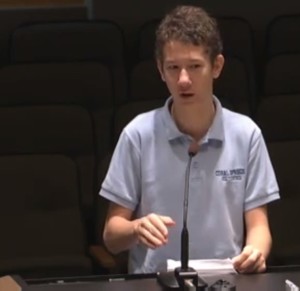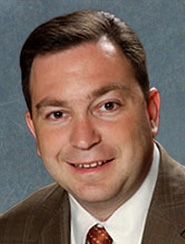Jeremy Ladanowski sometimes has a hard time being heard. The eighth-grader has speech apraxia, a condition that makes it difficult for him to form intelligible words.

His parents say they worry what will happen next year, when he gets to high school and will be expected to take at least two foreign language courses before he graduates. The family traveled to Tallahassee from South Florida last week to testify in favor of legislation that would give him a different option.
While he has a hard time speaking, Jeremy has found other ways to communicate. He’s started building his own websites in HTML, and modifying computer games. What if he could satisfy his graduation requirements by learning a different kind of language — a computer language?
“When he’s online, he has no disability,” his father, Andrew Ladanowski, told the Senate Education Committee as it considered a bill that would let students substitute computer science classes for foreign language courses.
The measure is sponsored by Jeremy Ring, D-Margate. Rep. Janet Adkins, R-Fernandina Beach, has introduced similar legislation in the House.
Ring, a former Yahoo executive, said jobs in virtually every field will soon require some understanding of computer science. But state lawmakers and school administrators have balked at other recent proposals to add seemingly sensible course requirements, like financial literacy. One reason: Students’ schedules are already stretched thin.
Ring’s proposal aims to overcome that problem by letting students use computer science to meet existing requirements. Instead of learning Spanish, French or Mandarin Chinese, why not let them learn C++?
“This is truly a global language,” he said. “It may not be a spoken language, but neither is Latin.”
The change might seem tailor-made for Jeremy Ladanowski. But his parents say adding the computer science option would further a larger a shift Florida lawmakers have long embraced, toward educational choice and customization. Jeremy doesn’t want a lower bar, they said, just different way to reach it.

“The state has really pushed for options and choice,” said Andrew Ladanowski, who sits on the school advisory board for the City of Coral Springs’s municipal charter school, where his son attends. “This is just the same philosophy of choice.”
Ring’s measure won the approval of the Senate Education Committee, but several members, including some who supported it, said they had concerns about how schools would implement it.
Dwight Bullard, a Democrat from Miami who teaches in public schools, said he feared there is already an “erosion of foreign language” in schools, especially in low-income neighborhoods.
He voted against the bill after lamenting a “lack of minority access” to technology that students would need to study computer science.
The elder Ladanowski said computer science is “where the future is,” and courses should be widely available, especially in large urban school districts like Broward County.
If some schools won’t offer it, he added, parents and students will likely gravitate to schools that do — and they should have the option to choose them.


